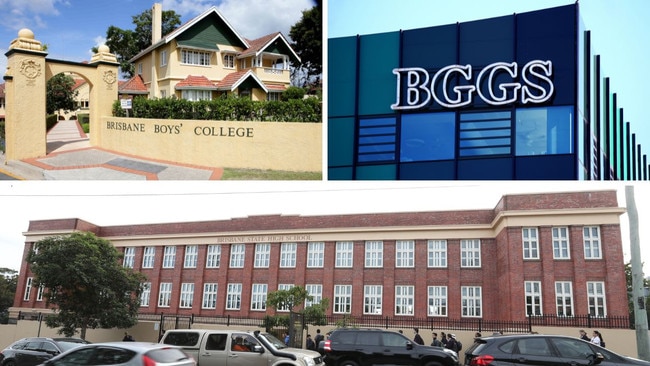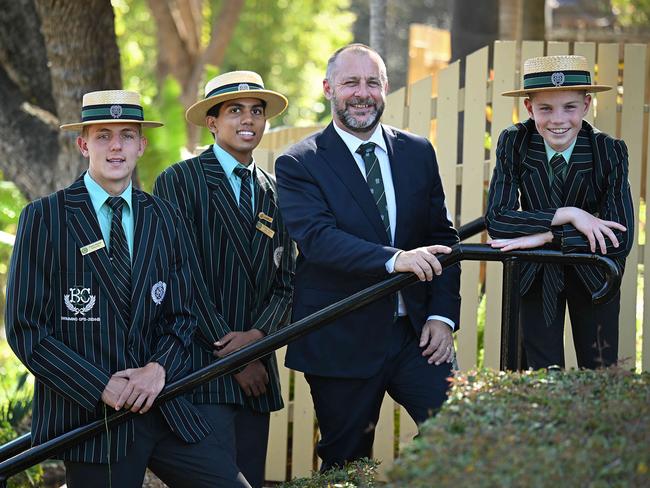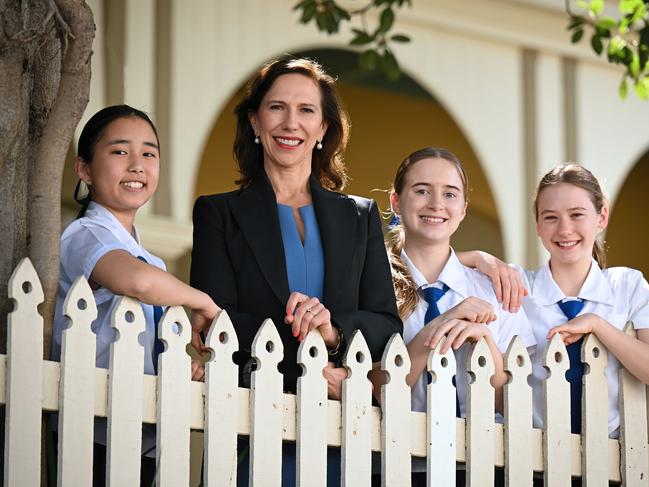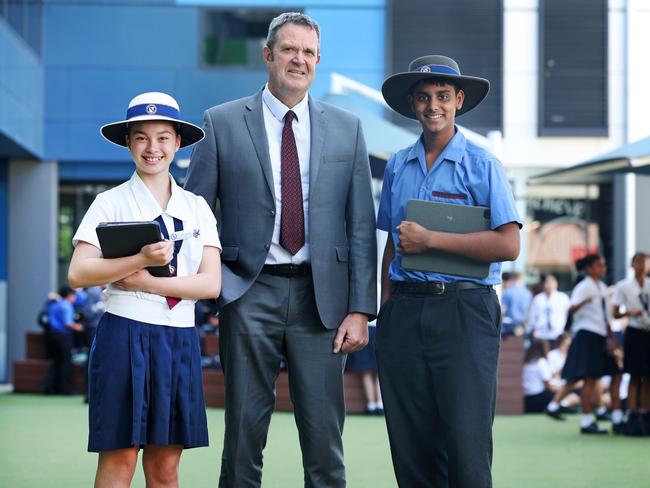NAPLAN Qld: Single-sex schools dominate, girls’ schools better
It’s the age old question, single-sex vs co-ed? We may finally have the answer.

QLD News
Don't miss out on the headlines from QLD News. Followed categories will be added to My News.
Students from Queensland’s single-sex schools are outperforming their co-ed counterparts, exclusive new analysis of NAPLAN data has revealed.
And four of the top five single-sex schools in the state are girls’ schools, The Courier-Mail can reveal.
The data on average showed 460 co-ed schools in the year nine cohort across the state received an average score of 542.3, while 50 single sex schools scored an average of 591.1.
The highest score students can receive on NAPLAN is 1000 and experts say the “limited distractions” at single-sex schools help.
Co-ed state school Queensland Academies for Science, Mathematics and Technology had the top average score of 694 and single-sex private schools Brisbane Girls Grammar and Brisbane Grammar School were second and third with 648 and 647 respectively.
Brisbane State High School was the next best public school with 642.
ACU Institute for Learning Sciences and Teacher Education Associate Professor Laura Scholes said single-sex schools were usually well-funded private schools with more pressure to succeed academically, including on the NAPLAN test.
“Year 9 can be a year when adolescents are going through a lot of transitions socially and developmentally,” Prof Scholes said.
“Single-sex schools may spend more time preparing their students for NAPLAN and limiting distractions. The old saying teaching for the test is still relevant.”
Prof Scholes said there were benefits of co-ed schools which included removing “gender norms”.
“Co-ed schools have the advantage of mitigating some of the least desirable attributes of all girl and all boy peer group cultures, where boys can take on hyper-masculine norms related to boyhood and girls can experience social pressures related to comparisons and body image.”
“Co-ed schools can develop a more inclusive and socially cohesive culture. They can provide spaces that go beyond narrow performance measures,” she said.
The pattern was consistent in NSW, Victoria and SA between co-ed and single sex schools.
Victoria across 485 co-ed schools had an average score of 563.5 for the Year 9 cohort compared to an average of 603.85 at the state’s 63 single sex schools.
In NSW, 678 co-ed schools scored an average of 556.5 compared to an average score of 600.64 across the 119 single-sex schools
Meanwhile, South Australia had an average score of 549.5 in 195 co-ed schools, with 17 single sex schools scoring an average of 585.6 in the year 9 cohort.
BRISBANE BOYS’ COLLEGE

Brisbane Boys’ College Year 9 student Andre Venter said he benefited from fewer distractions at an all-boys school.
“I noticed that there’s a lot less distraction and I know the girls, sometimes they can take your eye off what’s really important,” he said.
Andre said he had noticed a clear improvement in his own NAPLAN results from when he was at a co-ed school versus at Brisbane Boys College.
“You can form a lot closer connection with your peers, and it’s a lot more supportive than it might be in a co-ed school,” he said.
Headmaster Andre Casson said there were a number of factors that went into structuring learning for boys to achieve the best academic outcomes from students.
“Everything that we do in terms of energy, in terms of our offerings, academic, co-curricular, they’re all about making sure that the young men here at the college have a chance to thrive,” he said.
Mr Casson said Year 9 boys especially were often “relational” and wanted strong connections with the teachers.
“Boys like to be active, like to be moving so we give that opportunity in the in the classroom as well so in essence, that’s it. We look at being focused entirely on educating boys,” he said.
Ms Casson said when it came to NAPLAN there was no specific NAPLAN preparation.
“We go about structuring our lessons in a way that is able to reach as many boys as effectively as possible,” he said.
Mr Casson said in his experience at co-ed schools, female students were generally far more articulate and often dominated class discussions.
“We don’t have that happening here at BBC, because we’ve only got our boys here,” he said.
“… the boys get to fill all the roles that might exist in the classroom, they get to shine without being compared to the girls in the classroom.”
Mr Casson said for Year 9 boys, the school was conscious of their competitive nature, especially when it came to NAPLAN and other exams.
“We like to do the very, very best that we can in those competitive activities. So to play on that kind of gamification of this exam is a good idea,” he said.
“…so you’re using that positive aspect of the competitive nature of boys education to get the best out of them, not just in that NAPLAN, but we also do the same thing with their final exam.”
BRISBANE GIRLS GRAMMAR SCHOOL

In comparison to BBC, Brisbane Girls Grammar School (BGGS) Principal Jacinda Euler Welsh said for year 9 girls, they tried to turn the focus off competitiveness among students.
“They understand that all they have to do is the best they possibly can, and therefore it’s more of a cooperative, collaborative, not competitive approach,” she said.
“The girls support one another to do their best, they take their learning seriously, and they celebrate one another’s success so it’s a truly supportive sisterhood environment.”
Ms Euler Welsh said year 9 girls learnt best when they had a thorough understanding of the content that “excited” their interests.
“So in a in a girls classroom environment, in year nine, for example, you’ve got to explain the why. Why are we learning this particular topic? Why are we developing those skills? And how do we celebrate success?”
“Girls like to see that they’re achieving, that they’re progressing, and that learning is always an ongoing process,” she said.
Ms Euler Welsh attributed the school’s high results to setting the girls up as seeing themselves as “ Co-pilots in their own learning”.
“It’s not just about a few shiny people doing well, it’s about everybody doing a little bit better than they otherwise might have,” she said.
When it came to NAPLAN, Ms Euler Welsh said like other schools they focused on the learning process in the lead up to the tests rather than the outcome.
“If you focus on the process and all of the elements that go into that, that will lead to the best possible results, it also develops lifelong learning, which has tremendous longer term benefits,” she said.
BGGS Year 9 Student Karin Sagara said she felt going to an all-girls school allowed her to concentrate on her studies.
“It also gives a more comfortable nature of the school with the girls, especially talking about issues on things that won’t as won’t be as comfortable to talk about at a co-ed,” she said.
“The school is really open here, and I feel like that makes everyone feel steady and comfortable and also closer with each other to form strong relationships,” she said.
BRISBANE STATE HIGH SCHOOL

Brisbane State High School, known for achieving high NAPLAN scores consistently, is co-educational.
BSHS Principal Greg Pierce said the NAPLAN results came down to the school’s core values of active learning and excellence.
Mr Pierce said he was aware research had shown higher performance in single-sex schools.
“Here, it is different because we have got, we’ve got the best of both worlds, we’ve got girls who can compete against other girl’s schools and also in the GPS for the boys,” he said.
“If you’re looking at it through a gender lens, our students have the opportunity to compete, gender wise, and a lot of different fields, other schools and other students in Queensland.”
Mr Pierce said being co-ed created a more balanced opportunities both inside and outside the classroom.
“One aspect of Brisbane State High School, which is unusual from my perspective, is the amount of time that heads of department and the heads of year and the senior leadership team spend developing learning pedagogy and strategies,” he said.
BSHS Year 9 Student Lucy Choi-Lawrence said the school was more inclusive and she felt well-prepared for NAPLAN.
“We practised numeracy and reading comprehension, and that get got us used to like timed conditions and also got reminders at assembly about different study practices we could use,” she said.
Ms Choi-Lawrence said being co-ed, she felt there was a strong sense of community.
“I’ve gone to a co-ed school since primary school so I don’t really know any different, but, yeah, I really like the variety and diversity in our school.”
More Coverage
Originally published as NAPLAN Qld: Single-sex schools dominate, girls’ schools better





